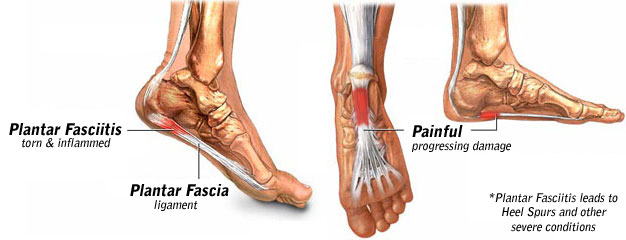PLANTER FASCIITIS
Plantar Fasciitis refers to the inflammation of bone (medial calcaneal tuberosity) and plantar fascia resulting in heel pain. This condition affects women twice as often as men. It is not specifically associated with any particular foot condition, but more commonly found in overweight persons, runners, dancers, gymnasts, soccer, volleyball, and tennis players.
Pathogenesis:
The plantar fascia or aponeurosis is a broad ligament that extends from the heel bone to the base of the toes. This aponeurosis helps to support the arch of the foot. Chronic traction results in inflammation of the aponeurosis as it inserts into the calcaneus. Bone spur(s) may be present, but usually are incidental findings and it is the inflamed fascia that causes the symptoms.
Clinical Symptoms of Plantar Fasciitis:
Patients report focal pain and tenderness directly over the medial calcaneal tuberosity. The pain is most severe upon awakening or when rising from a resting position, as the first steps stretch the plantar fascia. Non-weightbearing typically relieves the symptoms.
Physical examination:
Point tenderness at the attachment of the plantar aponeurosis to the heel on the plantar-medial surface of the foot (1-2 cm distal along the plantar fascia). Patients will often have tightness in the Achilles tendon, which contributes to increase tension on the plantar fascia during gait.
Treatment for Plantar Fasciitis:
Most patients (95%) improve with conservative treatment. Initial treatment consists of a home-stretching program for the Achilles tendon and plantar fascia. Use of contrast baths, ice, NSAIDS, and/or shoes with off the shelf orthotic devices (such as a heel pad) can be used. If symptoms persist after 8 weeks, injection of corticosteroid into the heel may be indicated. A formal PT program may be beneficial to help direct the patients stretching program. Physical Therapy for both Missouri and Illinois residents can be ordered. Persistence symptoms may require the use of a nonremovable cast, night splint, or AFO. Surgical correction should not be sought until at least 6 months of failed conservative treatment.
Contact Us
13710 Olive Boulevard (Primary Office)
Chesterfield, MO 63017
Telephone: 314-469-PAIN (7246)
Fax: 314-469-7251
Exchange: 314-441-6965 (for after-hour Emergencies Only)
Hours:
Monday thru Friday
8:30 AM – 4:30 PM


